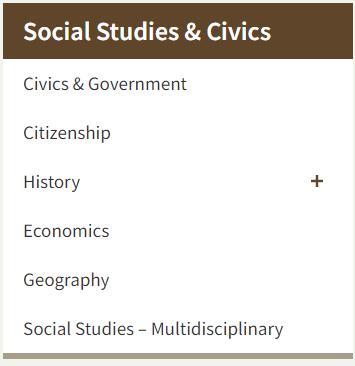- MN ABE Connect
- Archive
- Vote “Yes” for Effective ABE Social Studies Instruction
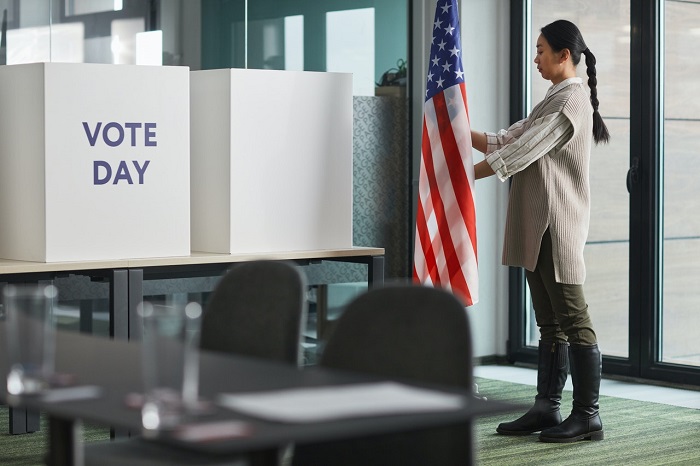 October 15, 2024
October 15, 2024
Vote “Yes” for Effective ABE Social Studies Instruction
John Trerotola, Social Studies and Civics Library CuratorA recent newsletter from the Minnesota Council for the Social Studies reminded us that “every election is the most important one because voting is our common power as citizens in a democratic society.”
This powerful statement reminds us, as adult educators, of the importance of not limiting lessons and discussions about voting, the electoral process, and civic participation in our classrooms. Yes, the countdown to election day 2024 is fast approaching, but do not stop the dialogue after November 5th.
National, state and local… it all matters!
Any election, especially a presidential one, creates an opportune time to answer students’ questions about the voting process. While students may or may not be eligible to vote, it is still important for everyone to be aware of what’s happening between now and November 5th.
Ballotpedia, Vote 411, and Vote Smart are three similar sites that offer unbiased information on elections, politics, and real-time public policy reports for all levels of government. Students can simply provide their zip code or other location details and they will be able to view a wide array of information to guide them through the voting process and/or to learn more about the critical issues of the day.
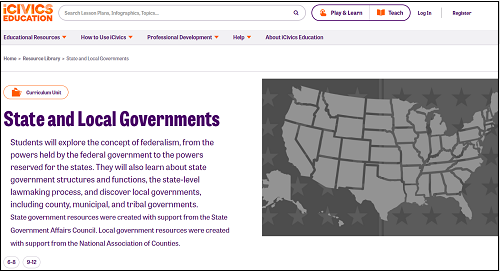 Of course, the presidential race gets all the attention, but it is also important to remind students to be aware of those current issues at the state and local levels. For background on the structure of state, county and local governments, turn again to iCivics. Their adaptable curriculum introduces students to how state and local governments operate through a series of interactive lessons and educational games.
Of course, the presidential race gets all the attention, but it is also important to remind students to be aware of those current issues at the state and local levels. For background on the structure of state, county and local governments, turn again to iCivics. Their adaptable curriculum introduces students to how state and local governments operate through a series of interactive lessons and educational games.
Along with classroom lessons, an effective way for students to become aware of local government is to experience it first-hand. Encourage students to attend a local school board and/or city council meeting. After helping students determine meeting times and places, prepare a “participation” guide that they can complete during a meeting and use as notes when reporting back to class. By observing local government, students can appreciate that civic participation can be accomplished by everyone.
Don’t believe everything you read… or hear
“Don’t believe everything you read or hear.” This reminder is truer today than ever before, especially during an election cycle that is occurring during a heightened digital age. One of the outcomes of social studies and civics instruction is a more informed citizenry. However, this goal is becoming a major challenge with the prevalence of fake news, deliberate (or not) misinformation, and the 24/7 flow of data from both print and digital media sources. With this in mind, Adult Education can take the lead by promoting instructional strategies to make ABE students – at all levels – more critical readers, listeners, and thinkers in this age of mass information.
Information/media literacy is a necessary skill for academic and workplace success and is essential for informed participation in society. If students cannot evaluate the quality of a source, how can they make good decisions on those candidates, topics and other issues that affect their everyday lives?
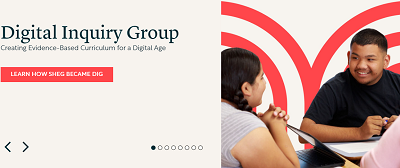 Fortunately, the number of information literacy resources and teaching strategies is growing. One to definitely consider is the very comprehensive civic online reasoning curriculum from the Digital Inquiry Group. This free resource has timely, leveled lessons and assessments on critically evaluating evidence and sources. Also, take a look at Stossel in the Classroom. This site supports students’ critical thinking skills by presenting paired videos with opposing views. Many of the videos include teacher’s guides and student activities.
Fortunately, the number of information literacy resources and teaching strategies is growing. One to definitely consider is the very comprehensive civic online reasoning curriculum from the Digital Inquiry Group. This free resource has timely, leveled lessons and assessments on critically evaluating evidence and sources. Also, take a look at Stossel in the Classroom. This site supports students’ critical thinking skills by presenting paired videos with opposing views. Many of the videos include teacher’s guides and student activities.
Don’t stop after November 5th!
Keep the classroom conversation about the electoral process going after November 5th. Because of the changing face of the voting process, it is much easier to compare and contrast voter participation soon after a current election has ended.
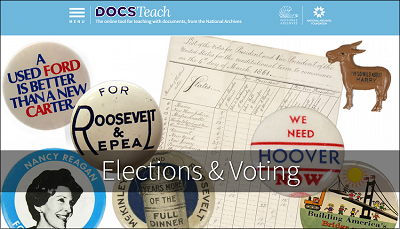 To aid in this compare and contrast, don’t be afraid to use primary sources. The Library of Congress has a set of maps and graphs that encourage students to examine historical data and identify election trends in the U.S. Similarly, the National Archives has compiled a vast collection of primary sources and teaching activities related to the election process and voting rights.
To aid in this compare and contrast, don’t be afraid to use primary sources. The Library of Congress has a set of maps and graphs that encourage students to examine historical data and identify election trends in the U.S. Similarly, the National Archives has compiled a vast collection of primary sources and teaching activities related to the election process and voting rights.
For something that covers many content areas, SERP is a free resource that has an excellent lesson on the question of mandatory voting and takes students through a series of reading, writing, math, and science tasks to explore this question. While the topic of voter turnout lends itself well to a post-election timeframe, it is one that can, at any time, be a critical component to a thematic unit on the right to vote in the United States.
Need More?
Resources related to voting, elections, and other social studies topics are not lacking in number. Fortunately, there are sites that have compiled collections of materials covering a variety of topics for a wide range of in-person and online classrooms.
Make sure to review a LINCS post that offers plenty of election and voting resources for all levels of adult learners. Also, there are other resources on the horizon. A group of ABE practitioners from Minnesota and other states are in the process of developing a civics-based curriculum called CILIA-T that will be appropriate for higher-level ELL classes. While still in its pilot phase, here is some additional information on what is to come.
Along with these, please don’t forget to access the ATLAS Social Studies & Civics online resource library for more details about some of the highlighted resources in this article, and about other leveled social studies materials. Using these, and other resources, will keep that social studies conversation with, and between, your students going throughout the entire school year!
Newsletter Signup
Get MN ABE Connect—the official source for ABE events, activities, and resources!
Sign UpArticle Categories
- ABE Foundations/Staff Onboarding
- ACES/Transitions
- Adult Career Pathways
- Assessment
- CCR Standards
- Citizenship
- COVID-19
- Cultural Competency
- Digital Literacy/Northstar
- Disabilities
- Distance Learning/Education
- ELA
- Equity/Inclusion
- ESL
- HSE/Adult Diploma
- Listening
- Math/Numeracy
- Mental Health
- Minnesota ABE
- One-Room Schoolhouse/Multilevel
- Professional Development
- Program Management
- Reading
- Remote Instruction
- Science
- Social Studies
- Speaking/Conversation
- Support Services
- Teaching Strategies
- Technology
- Uncategorized
- Volunteers/Tutors
- Writing
